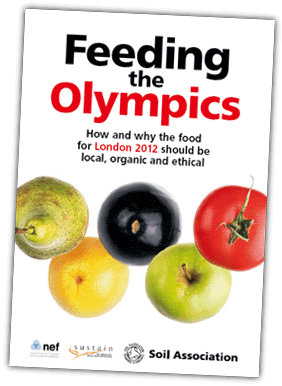 During 2007, Sustain worked with the New Economics Foundation and the Soil Association to produce the report "Feeding the Olympics", which is available to download on a separate page.
During 2007, Sustain worked with the New Economics Foundation and the Soil Association to produce the report "Feeding the Olympics", which is available to download on a separate page.
This marked the first step in a five-year campaign to ensure that the food associated with the London 2012 Games matches the values enshrined within the Olympic Charter, and the promises made in the London 2012 bid for the “most sustainable games ever”.
Specifically, the London 2012 Olympic and Paralympic Games bid promised “to support consumption of local, seasonal and organic produce”. With this report, we hoped to strengthen the resolve to meet these promises by providing both a rationale and a practical plan of action for making the London 2012 Olympic Games the first Games to serve sustainable food.
Because of their iconic nature, the Olympic and Paralympic Games are an opportunity to create changes in culture and policy – and the London bid was successful precisely because it was both visionary and ambitious. The Feeding the Olympics report sets out how those ambitions and promises must be met. With the eyes of the world upon London, it is imperative that the 2012 Olympic Games uphold the promises of sustainability and the promotion of healthy living in all aspects of the Games – throughout the construction period, during Games time itself, and in the legacy that is left behind.
Provision of food is a particularly important factor in sustainability. The environmental and social effects of providing about 1.3 million meals to construction workers and 14 million attendees during the Games can be either negative or positive, but will be very significant in either case. The longer-term impact of a sustainable approach to food provision for the communities, created for the legacy stage, will be even greater. This report therefore focuses on three key aspects of food for the London 2012 Olympic and Paralympic Games:
- provision of food during the Games time itself
- food for construction workers
- the legacy of the Games.
The report was written by environmental consultant and climate change specialist Robin Webster, commissioned by a partnership of organisations - New Economics Foundation, Sustain and the Soil Association, funded by a grant from Triodos Bank.
During 2007 and 2008, Sustain worked with the Food Programme of the Greater London Authority, and the Mayor's food advisor Rosie Boycott to arrange meetings with the head of sustainability for the London 2012 Games. This led to establishment of the London 2012 Food Advisory Group, on which Rosie Boycott and Sustain's Kath Dalmeny sat (along with several other trade and government organisations), which developed the London 2012 Food Vision. This was published in 2009, containing the health and sustainable standards to be met for catering for the London 2012 Olympic and Paralympic Games.
Olympic Food: Sustain ran a five-year programme of work to win healthy and sustainable food standards for the London 2012 Olympic and Paralympic Games.
